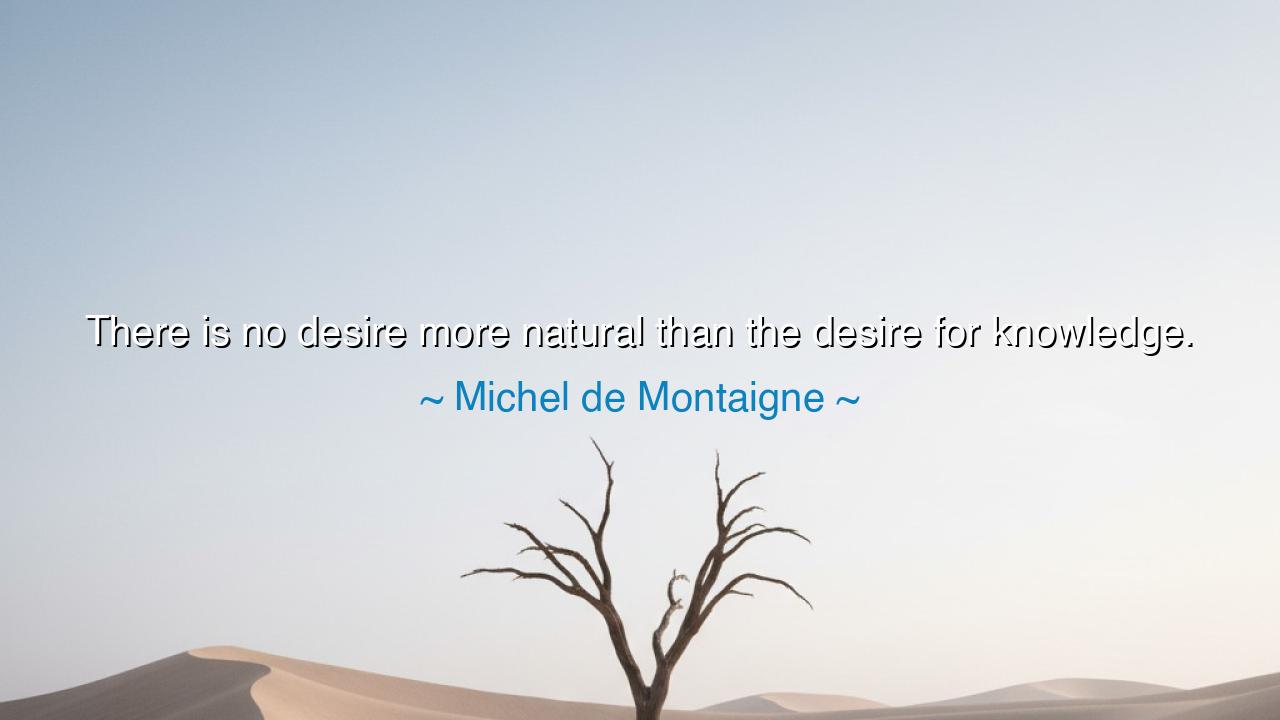
There is no desire more natural than the desire for knowledge.






In the words of Michel de Montaigne: “There is no desire more natural than the desire for knowledge.” These words cut to the very root of what it means to be human. For hunger may fill the belly, thirst may fill the mouth, but the thirst for knowledge fills the soul. From the moment a child opens its eyes, it begins to reach, to ask, to wonder. Before wealth, before power, before comfort, there is the primal urge to understand. This is the flame Montaigne saw as eternal—the flame that makes us not only creatures of flesh, but beings of spirit.
The ancients themselves declared this truth. Aristotle began his Metaphysics with the line: “All men by nature desire to know.” From the earliest myths, humans sought to pierce the mysteries of existence. Prometheus stole fire from the gods to give man not only warmth, but the light of understanding. The fall of Adam and Eve, too, is told as a story of the longing for knowledge, a longing so powerful it risked paradise itself. These tales reveal what Montaigne affirms: the desire for knowledge is woven into the very fabric of our being.
Consider the story of Galileo Galilei. Though the powers of his time forbade him from looking too far, his heart was restless, driven by this natural desire to know the heavens. He turned his telescope upward and uncovered moons circling Jupiter, shattering the old order. He risked condemnation, but he could not silence the inner compulsion to learn. Here lies the truth of Montaigne’s words: the desire for knowledge is not chosen, it is born within us, stronger than fear, stronger even than the chains of authority.
And yet, this desire can be both blessing and burden. For while it drives us to invention, to philosophy, to discovery, it also tempts us into realms we may not be ready to grasp. The builders of the Tower of Babel longed to pierce the skies, but their ambition collapsed into confusion. Thus, Montaigne’s words remind us: the desire for knowledge is natural, but it must be guided by humility, lest we mistake curiosity for wisdom.
The beauty of this truth is found in every generation. The child who asks “why,” the student who lingers with books late into the night, the scientist who dissects nature’s secrets, the poet who searches the hidden meanings of the heart—all are heirs to this same longing. It binds the peasant and the king, the ancient and the modern, for none are immune. The desire for knowledge is the great equalizer of humanity, the gift that levels palaces and huts alike.
The lesson is clear: cherish this desire, for it is your most human inheritance. Do not bury it beneath distractions, nor quench it with arrogance. Seek answers in books, in conversation, in the silence of reflection. Yet also guard your humility, for the more you learn, the more you must see how much remains hidden. Let your knowledge not make you proud, but make you kind, so that what you gain may serve not only yourself but the world.
Therefore, O seeker, remember Montaigne’s wisdom: the longing to know is not a curse, but a compass. Follow it bravely, but walk with reverence. For this desire for knowledge will lead you beyond your present self, beyond the limits of your age, into the vast and infinite mystery of truth. To follow it is to live fully; to ignore it is to deny your very nature. Let your mind be always thirsty, your heart always open, and your soul always rising toward greater understanding.






AAdministratorAdministrator
Welcome, honored guests. Please leave a comment, we will respond soon